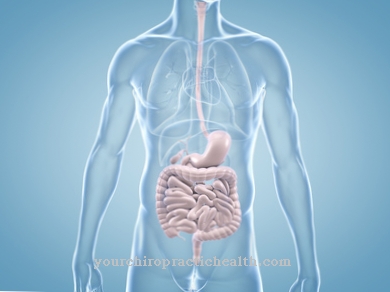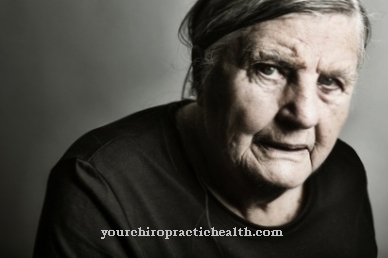Bleeding can occur wherever there is blood-supplied tissue, including in the gastrointestinal area, which medical professionals use the collective term Gastrointestinal bleeding sum up.
What is gastrointestinal bleeding?

The gastrointestinal tract is one of the most complex and largest human organs. The intestine alone is about ten meters long. There is thus enough space for gastrointestinal bleeding.
What distinguishes gastrointestinal bleeding from normal bleeding or injuries to the (mucous) skin is the fact that the stomach with its gastric acid and the intestine with its intestinal flora consisting of a large number of bacteria create a completely different environment , which make the case of a bleeding a little more explosive.
Once the gastric mucosa or the inner wall of the intestine are injured, the germs living there can unintentionally enter the bloodstream and delay the healing of the injured area. Doctors distinguish different types of bleeding depending on what is causing the gastrointestinal bleeding.
causes
Gastrointestinal bleeding is not a characteristic symptom of a single disease. Rather, a number of different causes come into consideration.
For example, a mechanical injury to the gastrointestinal tract, which leads to the bleeding, is possible if the person in question accidentally consumed a solid, sharp object over the meal. The mucous membrane of the small intestine, in particular, is particularly thin and therefore prone to mechanical injuries.
Another cause of gastrointestinal bleeding can also be the presence of an underlying disease. Chronic intestinal inflammation, such as Crohn's disease or ulcerative colitis, are conceivable here. Those affected by these diseases suffer from a permanently inflamed bowel due to a constant and misdirected reaction of their immune system.
The intestinal lining lesions caused by the inflammation begin to bleed, ultimately leading to the passing of bloody stools. In the worst case, gastrointestinal bleeding can also be a sign of an existing carcinoma, i.e. cancer (e.g. stomach cancer or colon cancer).
You can find your medication here
➔ Medicines for digestive problemsDiseases with this symptom
- Inflammation of the intestine (enteritis)
- Stomach cancer
- Reflux esophagitis
- Ulcerative colitis
- Colon cancer
- Mallory-Weiss Syndrome
- Crohn's disease
- Duodenal ulcer
- Esophageal varices
Typical symptoms & signs
- Nausea, possibly even vomiting blood (hematemesis)
- Stomach pain, abdominal pain and possibly abdominal pain
- Bloating
- Blood in the stool or tarry stool
Diagnosis & course
The cause of gastrointestinal bleeding cannot be determined by looking at the gastrointestinal area externally. X-rays or the less stressful ultrasound cannot provide a reliable answer to the cause and, above all, the extent of the gastrointestinal bleeding.
Detection of blood in the stool alone does not provide any indication of the cause. It is therefore essential to examine the stomach and intestines from the inside using probes, which is done as part of a gastroscopy or colonoscopy. A probe is inserted into the mouth and into the stomach of the patient or anally into the large intestine and the terminal small intestine (the last pieces of intestine that open into the large intestine).
The probes are equipped with a video camera and surgical instruments that enable the attending physician not only to examine, but also to take tissue samples. If there are tumor-like pieces of tissue, the doctor can remove them and later have them examined histologically, i.e. by laboratory medicine, in order to identify the cause of the gastrointestinal bleeding.
Complications
Bleeding in the stomach or intestines is always a serious warning sign of the body. A medical check-up is essential even if there are apparently small amounts of blood in the stool. Although pure mucosal inflammation, certain painkillers or harmless hemorrhoids can trigger bleeding, these symptoms can also hide dangerous underlying diseases or tumors.
In the event of intense, acute bleeding, such as from injured blood vessels or cracks in the intestinal wall, the emergency service must be informed immediately. Vomited blood, noticeable pain or black tarry stools also make it necessary to clarify the cause quickly. Often times, if the bleeding is minor, symptoms will go away on their own and there is nothing to worry about.
In the long run, unnoticed blood loss can reduce performance, lead to anemia or, in the worst case, death. Without treatment, those affected also risk the development of ulcers, which often grow unnoticed for a long time and are only noticed occasionally by bleeding due to past meals. As with all surgical interventions, the treatment is subject to a certain basic risk.
Nevertheless, the very widespread reflection for the stomach and intestines is considered to be very tried and tested.Occasionally, there may be slight bleeding after tissue removal. The wall of the gastrointestinal tract is rarely seriously injured by carelessness with the leading tube, which results in an emergency operation. The risks of a mere control intervention for diagnosis are, however, very low and can usually be carried out on an outpatient basis without hospital admission.
When should you go to the doctor?
If symptoms of gastrointestinal bleeding occur, it is advisable to see a doctor. This means that if you experience nausea or even vomiting blood, severe stomach pain, and blood in your stool, you should definitely see a doctor. This will first determine whether there is an injury in the gastrointestinal tract, which could be the cause of the bleeding, by means of an X-ray or ultrasound. The doctor can also determine the extent of the bleeding in the gastrointestinal tract.
If the patient has blood in the stool, examination of the gastrointestinal tract with a probe is usually unavoidable. As part of such a gastroscopy or colonoscopy, polyps, among other things, can already be eliminated as the cause. In the case of a gastroscopy, the doctor inserts the probe through the mouth; in the case of a colonoscopy, however, it inserts it into the anal. If a tumor is suspected as the cause, a tissue sample can also be taken using the probe, which is then examined in the laboratory for its benign or malignant nature.
Doctors & therapists in your area
Treatment & Therapy
How gastrointestinal bleeding should be treated depends on the specific cause. If a mechanical injury to the stomach or intestines was the cause of the bleeding, the wound heals by itself, provided the object causing the injury has been excreted. The gastrointestinal mucous membrane renews several grams of tissue in the course of a day. The result is rapid healing of the injured area.
The best possible treatment here is the administration of anti-inflammatory substances or the recommendation to forego anticoagulant drugs in order to reduce blood loss. In the case of chronic intestinal inflammation, on the other hand, the person affected must adhere to the general recommendations for his illness and, in the extreme case, feed via infusions.
By bypassing the gastrointestinal tract, it should be spared until the chronic inflammation calms down again and the gastrointestinal bleeding subsides. If necessary, immunosuppressants can be administered here, which work against the cause of the inflammation and thus the bleeding: the own immune system. How gastrointestinal bleeding is to be treated can therefore not be said in general terms, but depends on the type of bleeding and the cause.
Outlook & forecast
If mechanical injuries are responsible for the gastrointestinal bleeding, the further course depends heavily on the cause and the extent of the injury. Swallowing smooth metallic objects usually only leads to minor injuries, which quickly subside. The foreign body is excreted naturally. Sharp and pointed objects, as well as pieces of glass and broken glass, are dangerous. Such foreign bodies can cause life-threatening internal injuries and require emergency surgery.
If the causes of the gastrointestinal bleeding are not known, the patient must expect extensive tests to be carried out. The gastrointestinal area is then examined from the inside with probes as part of a colonoscopy. If pathological changes are found, the doctor initiates suitable therapies.
There are good therapeutic options for gastric and intestinal ulcers. Often, however, chronic diseases such as Crohn's disease or ulcerative colitis are also the cause of the symptoms. A cure is not always possible for chronic illnesses, but the doctor can alleviate the associated symptoms.
However, gastrointestinal bleeding can also be a sign of cancer. The only method that colorectal cancer can currently be cured is surgery. Other measures such as chemotherapy or radiation can only ensure the long-term success of the treatment.
You can find your medication here
➔ Medicines for digestive problemsprevention
Since gastrointestinal bleeding is not an independent disease, but is always associated with an underlying disease or an injury to the gastrointestinal area, it can only be avoided by preventing other underlying diseases. Of course, some causes of gastrointestinal bleeding cannot be foreseen, especially those whose actual causes have not yet been medically proven, as is the case with Crohn's disease, for example. A healthy, fiber-rich and varied diet as well as a lot of sport and exercise help to maintain a healthy gastrointestinal tract.
You can do that yourself
The cause of gastrointestinal bleeding should always be clarified medically, as well as whether the bleeding affects the stomach, the intestines or possibly both areas of the body. The cause are mostly inflammatory processes in the body. Self-help is ruled out in the case of gastric bleeding. However, your own digestive process can be improved.
Regardless of whether the stomach or intestines are affected - both areas are involved in the digestive process. In the case of existing bleeding, irritating foods - spices that are too hot - and meals that are consumed too hot should be avoided. Likewise, alcohol fuels the inflammatory processes in the body. Eating too large portions also puts a strain on the stomach and intestines. In most cases, it is recommended to take several small meals spread over the day. It is beneficial for the digestive process to drink a glass of water about half an hour before meals and to avoid drinks during the meal. In this way, the gastric acid required is not additionally diluted and the body is not stimulated to produce more.
Phases of movement and relaxation are also beneficial. Movement stimulates the digestive system as well as the entire metabolism. Phases of relaxation - which can also be actively shaped by practicing techniques such as yoga or chi gong - reduce the cortisone content in the blood and increase the release of serotonin. The intake of micronutrients such as selenium also helps the body to slow down inflammatory processes. Alternative healing methods, such as Bach flower therapy, can also be tried out against stress in everyday life.


.jpg)










.jpg)

.jpg)
.jpg)











.jpg)